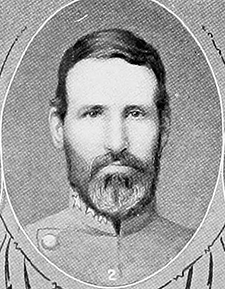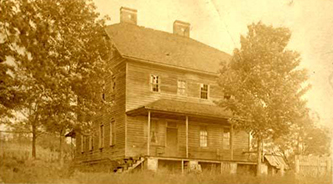6 Oct. 1810–8 July 1862

Montfort Sidney Stokes, military officer, was born at Morne Rouge, the Wilkes County home of his parents, Montfort and Rachel Montgomery Stokes. He was a grandson of Hugh Montgomery, who served under royal governor William Tryon in suppressing the Regulators. The elder Montfort Stokes was a major general in the War of 1812, governor of North Carolina (1830–32), and a U.S. senator. Sid, as the younger Stokes was called, was appointed a midshipman on 12 May 1829 and received his initial training at the Navy Yard in Norfolk and at the Norfolk School. During his training he also served on the frigate Brandy-wine, initially in the Mediterranean. On 15 Sept. 1835 it was noted in his record that he was "warranted as passed midshipman" from 3 July. At various times from 1834 to 1836 he was reported on leave of absence, usually in three-month spans but once for six months, although no reason was given.
In 1837 Stokes was awaiting orders for active service. From St. Petersburg, Russia, on 10 Aug. 1837 he wrote a long letter to his childhood friend, James Gwyn, recounting some of his naval experiences. He had recently been in England and Denmark and described in considerable detail his impressions of Russia. He also reported a recent visit by the Russian emperor to his ship. Czar Nicholas I, who spoke excellent English, was disguised as an ordinary sailor, as he wanted to see the American ship and not be given a royal reception. His disguise, however, was quickly discovered but not revealed to the guest until his tour of the ship was over. Thereupon he was most properly welcomed aboard.

On 20 Mar. 1837 Stokes received orders for service on the razee Independence off the coast of Brazil, but on 6 Apr. 1838 he was granted permission to return to the United States at his own expense. On 7 Dec. 1838 he was reported "Destined for the West Indies" for service on the frigate Macedonian. Writing from Raleigh on 24 December, however, he "reluctantly" asked for a twelvemonth furlough. The request was denied, and he resigned effective 6 Feb. 1839.
After resigning from the Navy, he returned to Wilkes County and engaged in farming. On 10 Apr. 1847 the First Regiment of North Carolina Foot Volunteers was called into federal service at the beginning of the War with Mexico, and Stokes was commissioned major of the regiment. He served in Mexico, where he was highly regarded by his men not only for his excellent leadership but also for his consideration of them under adverse conditions; after the war they had a handsome sword made for him and engraved: "Presented to Major M. S. Stokes, of the N.C. Vol. by the non-commissioned officers and privates under his command in Mexico" and "Major M. S. Stokes, the Soldier's Friend." The sword is now in the North Carolina Museum of History in Raleigh.
After the war he settled in Wilkes County, where he raised cattle that he drove to market in Philadelphia. The General Assembly named him to the Council of State for the years 1850–51. Stokes was a friend of President Franklin Pierce and visited him in the White House. He also was an interesting lecturer and often visited community schools to talk with young people about his wide-ranging experiences.
At the beginning of the Civil War, Stokes volunteered for service with the Wilkes Valley Guards and was chosen first lieutenant. His unit, sent to Warrenton for its initial training, was designated Company B, First Regiment. A soldier from Mississippi, who was already at the camp when the North Carolina troops arrived, commented that Stokes was "a splendid officer, well prepared to drill in regimental or brigade maneuvers." With the formal organization of the regiment, Stokes was appointed colonel on 15 May 1861. His earliest active service was in Virginia until he was called back to help defend Goldsboro. After returning to Virginia and participating in action there, he was severely wounded in an engagement at Elyson's Mill on 26 June 1862. When offered something for the pain, Stokes declined and directed that it be given to wounded soldiers instead. Eleven days later he died in a Richmond hospital. His body was taken home by his body servant, Isaiah, and buried in the family cemetery in front of his home on the banks of the Yadkin River.
In 1858 Stokes married Sarah E. (Sallie) Triplett of Wilkes County. They were the parents of a son, Laurence Crane, who became a physician but died while still a young man, and a daughter who married Charles Hunt. Mrs. Stokes died a few months before her husband of typhoid fever contracted at Goldsboro when she visited him there.